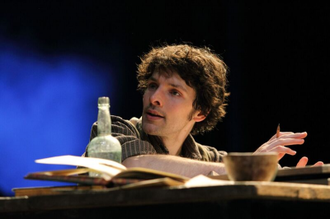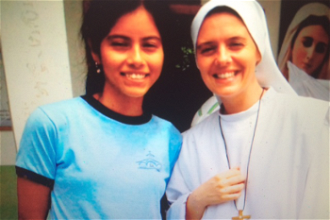Review: 'Translations' at the National Theatre

Colin Morgan (Owen) in Translations - image Catherine Ashmore
Mist swirled at the back of the stage, behind a hill, as lights dimmed and a packed audience silently anticipated the start of 'Translations'. It was the backdrop of the play throughout, setting the scene of foggy evenings in Donegal, but also reminding of the mists of time where the land has seen many generations come and go, and recalling images of no man's land in wartime, particularly when soldiers appeared.
Action at the Olivier at London's National Theatre was to centre around a rural 'hedge school' where the room opened straight out onto fields, grassy mounds, piles of cut turf and water troughs. We even had rain, including the sound of it being caught in a bucket, prompting a feeling of being flies on the wall, transported to the west of Ireland.
Brian Friel's great play 'Translations' is set in 1830s Baile Beag (later anglicised to Ballybeg), where British soldiers arrive to undertake an ordnance survey involving the anglicisation of Irish place names. They are brought to the Irish-speaking hedge-school by their civilian interpreter Owen (Colin Morgan), who has been away in Dublin for six years and whose father Hugh (Ciarán Hinds) is the headmaster.
Plans are underway to replace schools like this with a national education system where English is the official language. Brien Friel described the play as being "about language and only language", and it examines the multi-layered functions of language in the clash of cultures, where the language of the occupying military power is likely to have the ascendency. The mapping of Ireland and the imposition of English place names was part of a process that has complicated political and cultural overtones for the Irish people that resonate to this day.
The strong engagement of the audience was underlined by a wonderful set, but also by a very strong and energetic cast. Colin Morgan and Ciarán Hinds are the big names, returning to their Irish roots, but all are excellent. The friendship between Owen and English lieutenant, Yolland (Adetomiwa Edun), had a real warmth, reminding me of their bond in the cult TV series 'Merlin', which made them both famous. Hugh and Jimmy (Dermot Crowley) are an older generation, involved in the hedge school but steeped in Latin and Greek and in etymology generally. Hugh's concluding speech of the play - quoting from Virgil's Aeneid on the destruction of Carthage by Rome - suggests that there is a fatalistic inevitability about the domination of the conqueror's language - and, unfortunately, the relevant language that he doesn't speak is English. The play has no resolution and its sombre conclusion reminds that the sceptre of famine hangs over the period, even though it's in the future.
The play opens with Hugh's second son Manus (Seamus O'Hara) helping Sarah (Michelle Fox), who has a speech defect, say her name. Throughout, her lack of language undermines her power to influence and ability to make her feelings known, although the audience notices her every frustration. Owen is the translator between the Irish and English and feels he has adapted to the modern world. He is the only person in the play who can speak both Irish and English, and is positive about bridging the divide between the two. When Hugh describes Irish as "a rich language" with "ostentations entirely lacking in their material lives" and suggests the Irish are "a spiritual people", Owen tells him to "stop that nonsense, father". However, Manus points out later that the English have eroded Owen's identity, calling him by a name they have chosen - 'Roland' rather than his own name. In his job Owen has the power to change and erase meanings that are essential to his identity, and that of the Irish people, and he comes to feel that he has not used it wisely.
The political overtones of the mapping process gradually dawn on him and he moves from a disdain of the long-standing place names - laughing that many are rooted in people's stories and rural traditions - to learn new respect for the Irish language and culture from Yolland, the officer and friend who falls in love with both, and indeed with a local Irish girl, Maire (Judith Roddy). But there is a complexity here too. Maire feels "we should all be learning to speak English" and is interested in emigration. She is distraught when Yolland, her contact with the outside world, disappears, presumed abducted and killed by Irish militants. Owen in turn is dismayed when the English Army begins to burn villages in reprisal for the disappearance of Yolland, and he renounces his role with them. He throws a place name book across the room in the hedge school, calling it a "mistake". When Hugh advises Owen to learn the new names "for we must learn where we live", Owen retorts, "I know where I live".
This is a play with multi-layered complexity and irony. The Irish community deplores English insensitivity to their culture but then show intolerance themselves when Maire begins the relationship with Yolland. Owen returns to his family as a city boy and English-speaking, but has a gut reaction to say loudly in Irish, "Beautiful! Honest to God, it's such a delight to be back here with you all again". Colin Morgan's Owen goes on to express the deep emotion of a man caught in the crossfire between two cultures. It is a theme he is obviously attracted to in his projects, and has the acting skill to explore sensitively in a range of roles - as Leo in the TV series 'Humans', which is airing at the moment, and his film, 'The Happy Prince'.
Both Irish and English characters in the play "speak" their respective languages, but in actuality it is English that is mostly spoken by the actors. This allows the audience to understand the languages and hear both sides, even if on stage the characters cannot comprehend each other. Yet in the play's lovely scene where Maire and the English lieutenant express their love in their respective languages, we see the power of passion to transcend verbal signals.
Yet, language is presented as vital not just as a means of communication, but as linked to identity and nationality. There is a resonance with the highly charged political and cultural context of Northern Ireland today, and note that the play was written at the height of "the troubles" in 1979. For me, there was also a resonance that more than half the 7,000 languages spoken in the world today are at risk of extinction, many of them indigenous peoples' languages. The Owens of many cultures know that if they want a professional qualification then their native languages will not be useful.
Ian Rickson production has been described as "flawless" - I'd agree with that. And I haven't even mentioned some aspects such as the music, which maximised the emotion on stage so beautifully. And the humour which made the characters so real and human. It might have much to do with my spiritual attachment to my own Irish heritage that I found it so meaningful. In fact, I am going to see it again in July, especially to appreciate the intricacies I missed first time around!
'Translations' is on at the National Theatre's Olivier stage, London, until 11 August.
See: www.nationaltheatre.org.uk/shows/translations


















